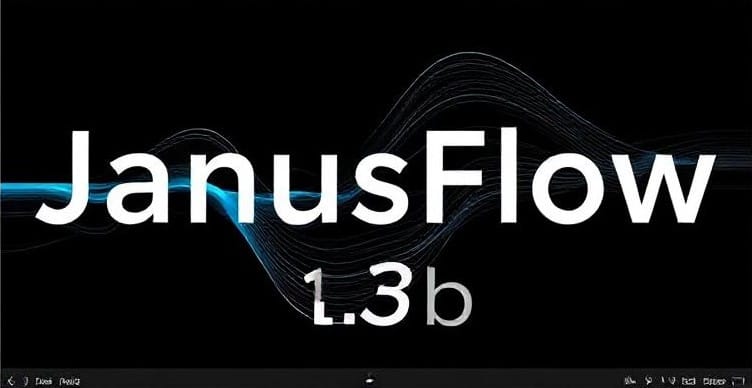How to Install and Set Up JanusFlow 1.3B on Linux

JanusFlow 1.3B is a text-to-image generator developed by DeepSeek, designed to provide versatile image creation capabilities from textual prompts. It is a part of DeepSeek's Janus family of models, known for multimodal understanding and generation.
This article provides a comprehensive guide on how to install and set up JanusFlow 1.3B on a Linux system, ensuring you can leverage its potential for various applications.
Key Features of JanusFlow 1.3B
- Text-to-Image Generation: Create images from detailed textual descriptions.
- Multimodal Understanding: Combines text and image processing for versatile applications.
- High-Quality Outputs: Generates photorealistic and artistic images.
- Open-Source Integration: Compatible with platforms like Hugging Face and ComfyUI.
Prerequisites
Before starting the installation, ensure your Linux system meets the following requirements:
- Operating System: A stable version of Linux (e.g., Ubuntu, Debian, Fedora).
- Python: Python 3.10 or higher is recommended.
- pip: The Python package installer.
- Git: For cloning the Janus project repository.
- GPU: A powerful GPU is recommended to accelerate computations. While the model can run on modest configurations, performance will be limited.
- CUDA: If using an NVIDIA GPU, ensure CUDA is properly installed and configured.
Step-by-Step Installation Guide
1. Installing Required Packages
First, open your terminal and update the package list:
sudo apt update
Next, install Python 3.10 (if not already installed) and pip:
sudo apt install python3.10 python3-pip
Verify the installation:
python3.10 --version
pip3 --version
2. Cloning the Janus Project Repository
Clone the Janus project repository from GitHub:
git clone https://github.com/deepseek-ai/Janus.git
Navigate to the cloned directory:
cd Janus
3. Setting Up the Environment
Create a virtual environment to manage dependencies:
python3.10 -m venv venv
source venv/bin/activate
4. Installing Dependencies
Upgrade pip and install required packages:
python3.10 -m pip install --upgrade pip
pip install -e .
pip install diffusers[torch]
5. Downloading JanusFlow 1.3B Model
Download the JanusFlow 1.3B model from Hugging Face:
wget https://huggingface.co/deepseek-ai/JanusFlow-1.3B/resolve/main/diffusion_pytorch_model.bin
Create a directory and move the model file:
mkdir -p ./model/JanusFlow-1.3B
mv diffusion_pytorch_model.bin ./model/JanusFlow-1.3B/
6. Configuring the Environment Variables
Create and edit a .env file:
touch .env
Add the following line:
export IMAGE_MODEL_PATH="./model/JanusFlow-1.3B"
Load the environment variables:
source .env
7. Testing the Installation
Create a Python script named test_generate.py:
import torch
from diffusers import StableDiffusionPipeline
model_id = "your_model_path/JanusFlow-1.3B"
pipe = StableDiffusionPipeline.from_pretrained(model_id, torch_dtype=torch.float16)
pipe = pipe.to("cuda")
prompt = "A futuristic cityscape, ultra detailed, photorealistic"
image = pipe(prompt).images[0]
image.save("futuristic_cityscape.png")
Replace "your_model_path/JanusFlow-1.3B" with the actual model path and run the script:
python test_generate.py
Troubleshooting Common Issues
JanusModelLoaderError:- Ensure all dependencies are installed.
- Reinstall the model if necessary.
- Git Installation Issues:
- Install Git using
sudo apt install git. - Manually download the repository if Git fails.
- Install Git using
- CUDA Errors:
- Verify CUDA installation with
nvcc --version. - Update NVIDIA drivers.
- Verify CUDA installation with
- Out of Memory (OOM) Errors:
- Reduce image resolution or batch size.
- Use a smaller model or move to CPU (slower performance).
- Dependency Conflicts: Use a clean virtual environment and resolve package conflicts.
Optimizing Performance
- Use a High-Performance GPU: A powerful GPU ensures faster image generation.
- Enable xFormers: Install and enable xFormers for optimized attention mechanisms.
- Adjust Image Resolution: Balance quality and performance by tweaking resolution.
- Monitor GPU Usage: Use tools like
nvidia-smito track GPU performance.
Exploring Advanced Features
- Textual Inversion: Fine-tune the model with custom concepts.
- ControlNet: Guide image generation using input images like sketches.
- Image-to-Image Generation: Modify existing images based on text prompts.
- Inpainting: Replace specific parts of an image with new content.
- Prompt Engineering: Experiment with detailed prompts for better results.
Conclusion
JanusFlow 1.3B is a powerful tool for text-to-image generation, offering endless possibilities for creativity and innovation. Whether you're generating art, designing prototypes, or exploring AI capabilities, JanusFlow 1.3B is a valuable addition to your toolkit.